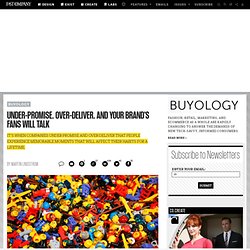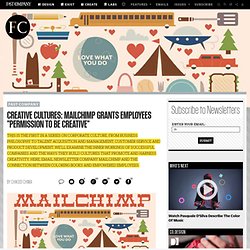

Under-Promise. Over-Deliver. And Your Brand's Fans Will Talk. In a small restaurant in Shinjiku, a suburb of Tokyo, I ordered sake.

First, the waitress placed a small wooden box in front of me. Then she arrived with a large tray carrying 40 cups. Each one, she explained, represented a different personality. I chose a blue cup, which she removed from her tray and carefully placed in the box. As she began to pour the traditional drink into my small blue cup, things took a decidedly unusual turn.
As I nimbly attempted to fish for the cup, I asked her why she had poured so much. Do you remember the last time you got more than you expected? Some years later, I visited the factory and the manager told me that those extra bricks were more a matter of practicality than goodwill. Devalued as my collection of special bricks may have been in that childhood moment, what Lego had inadvertently achieved was to over-deliver and under-promise. These days, we seem to be following a reverse philosophy. About 20 minutes later, I heard a knock on my door. Who knows? Trust Me: Here's Why Brands Sell Trust, Subconsciously. Let's say that not that long ago you came across a fascinating article.

But when you later try to verify some of the facts, you just can't pinpoint exactly where you first read it. What you do recall is that the source was reliable and you trusted the message. This is a situation I find myself in quite regularly. So much so, that I've pondered the conundrum and come up with a theory: we store information according to how trustworthy we deem the source of the message to be. There's more to it. Many studies demonstrate that trust, above all else, becomes a more salient feature in our life as we grow older. In a 2010 study conducted by Harvard professor Bharat Anand, and Alezander Rosinski, they examined how the power of ads are influenced by the magazine or newspaper they appear in.
Which brings me back to my theory on how we store information according to our levels of trust. But there was one observation that totally surprised me. The answer was a clear and resounding "Yes! " Train Your Computer, Monitor Your Brand Online Using "Sentiment Analysis" The next guest in our futurist series, Crystal Ballin’, is Seth Redmore, VP of Product Management at Lexalytics, a major player in the realm of text and sentiment analysis.

Want to keep track of what people are saying about your brand on the Internet? Lexalytics’ engine, "Salience," can help you do that. But despite initial successes, we’re only at the beginning of what text analysis might achieve in the future--as Redmore points out, a computer can easily confuse a harmless family anecdote with animal pornography. What follows is an edited transcript of our talk. FAST COMPANY: Before we talk about the future of text analysis, let’s talk about its present. SETH REDMORE: It’s very simple: you give us a piece of text, and we tell you who’s being discussed, the context of the conversation, and is it positive or negative.
“Sentiment analysis” seems complicated. One really good example was that after the oil spill, BP was getting slammed, Louisiana was getting slammed, and so on. Creative Cultures: MailChimp Grants Employees "Permission To Be Creative" One day, MailChimp CEO Ben Chestnut discovered that his company had acquired a new tagline.

Chestnut hadn’t approved, or even known about this rather significant new bit of corporate identity, but there it was--"Love What You Do"--on the footer of the company website. At most companies, changing a piece of punctuation in a line of ad copy takes three weeks of meetings between about 14 people across six departments. So typically this would be the kind of occasion that terms like “tearing a new one” and “terminated with extreme prejudice” were made for. But there would be no new orifices created that day.
Chestnut, the founder of email marketing and newsletter company MailChimp, does things a little differently. MailChimp has added a splash of mischief to a product category not known for…well, much of anything. “Look at the name MailChimp,” says Chestnut. “We weren’t banking on MailChimp, so we could take risks and be funny, and very non-corporate,” says Chestnut.
Internal Branding. Personal Branding. Product Branding. Employer Branding. Corporate Branding.